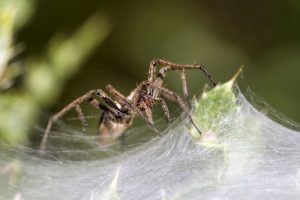Why Do I Have So Many Spiders Inside My Home?
By Chris Williams on May 27, 2011.
Q. It seems like I am always finding cobwebs in the corners of rooms in my house. My neighbor makes fun of me. She says she doesn’t have spiders. Why do they like my house so much?
A. There’s probably more than one answer. You may have an abundance of openings that let spiders in from outside: Doors or screens that don’t fit tightly, vents that aren’t screened. Spiders will move in because they can, because outside conditions get too dry or too wet or too cold, or because they have found a food source inside your home.
 Of course, it doesn’t take many spiders to find their way in to start an indoor population. A typical spider’s egg sac (that beige, fuzzy ball that you see in the web) can hatch out hundreds of baby spiders. A female can lay several egg sacs. But to keep a spider infestation going inside, it does take some kind of prey for the spiders to feed on and that would mean insects, mites, or other arthropod pests. There are all kinds of indoor pests that make good spider food such as cockroaches, fungus gnats, carpet beetles, house flies, crickets, Indian meal moths, earwigs, even other spiders. Sometimes you can get an idea of what the spiders are feeding on by checking the remains in and under their webs. Not all spiders build webs though; some are free hunters that wait in hiding for their prey.
Of course, it doesn’t take many spiders to find their way in to start an indoor population. A typical spider’s egg sac (that beige, fuzzy ball that you see in the web) can hatch out hundreds of baby spiders. A female can lay several egg sacs. But to keep a spider infestation going inside, it does take some kind of prey for the spiders to feed on and that would mean insects, mites, or other arthropod pests. There are all kinds of indoor pests that make good spider food such as cockroaches, fungus gnats, carpet beetles, house flies, crickets, Indian meal moths, earwigs, even other spiders. Sometimes you can get an idea of what the spiders are feeding on by checking the remains in and under their webs. Not all spiders build webs though; some are free hunters that wait in hiding for their prey.
Spiders are often found in kitchens and bathrooms because their prey are found in these sites, attracted by food and water. Spiders are also common in basements, garages, and closets because these are areas that are rarely disturbed or cleaned. Spiders are common around windows and doors, especially near indoor or outdoor lights that attract insects.
Some people choose to live with spiders, recognizing that they are beneficial in getting rid of other pests. If you can’t live with spiders, frequent cleaning is your best bet for getting rid of them.
- Vacuum on a regular basis to remove the spiders, their webs, and their egg sacs.
- Remove extra clutter that provides hiding places for spiders (and their prey) such as unneeded stacked papers, boxes, and bags.
- Store items off of the floor and away from walls.
- Don’t store boxes or items under beds.
- Dry out and ventilate damp areas like basements to make them less desirable to spiders.
- Repair loose screens or gaps around doors (especially garage doors) that let spiders and their prey inside.
- Keep porch lights off as much as possible and move lamps away from windows.
- Don’t stack wood or stones against the outside of the house.
- Reduce heavy vegetation and mulch around the foundation.
- Use a high pressure hose to wash spiders and webs off of the outside of the house.
Have a professional pest control company do an exterior perimeter treatment around your house to eliminate spiders and their prey before they can get inside. A professional can also determine whether you have another indoor pest problem that is attracting spiders. Finally, here’s some good news. The number of spider webs present in your home is not necessarily an indication of the size of the spider infestation. Some spiders will abandon a cobweb if it is unproductive (no insects caught) and will build a new one. Tell that to your neighbor!
Sign up for our biweekly email newsletter for more information about bugs and pests!